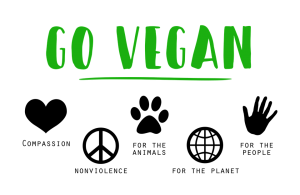Nov
13

Posted by Ann Madhavan on November 13th, 2017
Posted in: Health Observances, News From NNLM PNR
 It’s World Vegan Month, and as the PNR’s only vegan, I thought I would take the opportunity to post about this little known celebration. It has always struck me as odd that World Vegan Month should fall during Thanksgiving, a holiday renown for the consumption of vast amounts of turkey and ham. But then again, the vast majority of Americans are not vegan.
It’s World Vegan Month, and as the PNR’s only vegan, I thought I would take the opportunity to post about this little known celebration. It has always struck me as odd that World Vegan Month should fall during Thanksgiving, a holiday renown for the consumption of vast amounts of turkey and ham. But then again, the vast majority of Americans are not vegan.
What are vegans? MeSH defines them as “persons who avoid consuming animal products or animal-derived substances, such as MEAT; EGGS; or HONEY. Some vegans also refrain from using animals or animal products in any form or for any purpose, such as in CLOTHING or household goods. (Year introduced: 2016).” It is quite telling that this subject heading was just added in 2016. Veganism and plant-based eating are becoming a “thing.” More and more research is pointing to the benefit of eschewing animal products and adopting a diet that is organic, plant-based, minimally processed, and easier on the environment. According to the Permanente Journal’s “Nutritional Update for Physicians: Plant-Based Diets,” research shows that plant-based diets are cost-effective, low-risk interventions that may lower body mass index, blood pressure, HbA1C, and cholesterol levels. They may also reduce the number of medications needed to treat chronic diseases and lower ischemic heart disease mortality rates. Physicians should consider recommending a plant-based diet to all their patients, especially those with high blood pressure, diabetes, cardiovascular disease, or obesity.” And that’s saying a lot, considering the fact that physicians haven’t been known for racking up a lot hours of nutrition education in medical school. The Academy of Nutrition and Dietetics has recently published a position paper on vegetarian diets and it also highlights the mounting evidence for adopting this lifestyle, including the environmental sustainability of diets rich in plants, as opposed to resource depleting animal products.
The plant-based movement is growing. The Plant Based Food Association and The Good Food Institute recently released new data which indicates an 8.1 percent growth in plant-based food sales since last year. And Baum and Whiteman, an international food and restaurant consultant, called plant-based dining 2018’s trend of the year. More and more meat free choices are becoming available in local groceries and restaurants. No longer are we relegated to eating from just the salad bar.
Thinking of giving this vegan thing a try? Keep in mind that you can be just as unhealthy a vegan as an omnivore. Potato chips and soda are vegan, after all. For guidance on vegetarian, including vegan diets, MedlinePlus offers a variety of useful links. And as I mentioned above, PubMed now includes a MeSH term for this dietary practice. In addition to NLM links above, I’d like to offer some additional resources that I have found both useful and evidence focused.
NutritionFacts.org
https://nutritionfacts.org/
Happy Healthy Long Life: A Medical Librarian’s Adventures in Evidence-based Living
http://www.happyhealthylonglife.com/
The Vegetarian Resource Group
http://www.vrg.org/nutshell/Polls/2016_adults_veg.htm
It Doesn’t Taste Like Chicken
https://www.facebook.com/itdoesnttastelikechicken
My own journey towards veganism started many years ago when I decided to experiment with a vegetarian and then vegan diet. Over the years, I shifted back a forth from vegan to lacto-ovo-vegetarian to pescatarian, but it was the reccurrence of an autoimmune disorder I had suffered from in my early twenties that convinced me to return to a plant-based, minimally processed diet. Both my family physician and my rheumatologist were in awe of how quickly my dietary choice lead to a remission of my symptoms, and a return to normal health. I’m vegan to stay.
While I don’t necessarily expect you to skip the turkey or ham this Thanksgiving, I do hope this post will give you some food for thought. I also hope you will add your comments below if this post has encouraged you to explore plant-based eating further, or if you’ve already decided to become an herbivore. Happy Thanksgiving! But please, don’t pass the Tofurky.